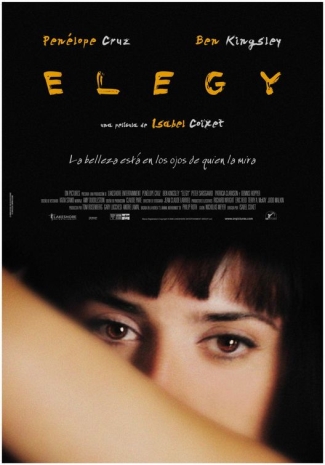
ELEGY
US/Spain, 2008, 108 minutes, Colour.
Ben Kingsley, Penelope Cruz, Dennis Hopper, Patricia Clarkson, Peter Sarsgaard, Deborah Harry.
Directed by Isabel Coixet.
While watching Elegy, for some reason The Human Stain by Philip Roth came to mind so it was not a great surprise during the end credits to find that this film is based on Roth’s The Dying Animal. It is set in one of those Roth worlds, New York academia, and has, again, the intelligent professor who can lecture on literary critique but who has skimmed through life, leaving wife and son, seeing marriage as a high security prison, engaged in seductive sexual relationships with undergraduate students while in a spasmodic relationship with a friend for twenty years. His closest ally and confidant is a Pulitzer Prize winning poet who sometimes offers sound advice, sometimes sardonic advice but who serves as his sounding board.
The story is about a man ageing. At first David (Ben Kingsley) is more an emotional and commitment failure. With a questioning and quizzical voiceover commentary by David, we review his life, watch his sometimes inept behaviour and become almost complicit in his seduction of an attractive Cuban student (Penelope Cruz). She touches him as no one has before which ultimately leads to his jealousy and a separation. He has ignored his rather righteous doctor son in the past but who now confesses to him that he is having an affair and reaches out to his father.
At the end, we are faced with themes of illness and dying and, perhaps, a modicum of hope, eliciting some sympathy if not empathy for David.
There is a strangely eclectic cast. Besides Kingsley and Cruz, there are Dennis Hopper in good form as the poet, Patricia Clarkson as the longtime companion and Peter Sarsgaard as the son.
The screenplay has been written by Nicholas Meyer (Time after Time, The Seven Percent Solution) and direction is by Spanish Isabel Coixet (My Life Without Me).
1.The work of Philip Roth? His literature? Themes? His focus on males, on females, interactions, sexuality?
2.The title, the original novella called The Dying Animal? The different tones and meanings?
3.A New York story, the city as a character, apartments, university, hospital, the beaches?
4.The voice-over, David and his tone, his self-knowledge, describing himself, his self-deception?
5.His character, age, the quotations from Bette Davis and Tolstoy about age? His saying he was not old in his head? His life, marriage, seeing it as a prison, leaving his wife and son? The relationship with his son, his son’s phone calls? His lectures, skill in literary criticism? His radio programs, television interviews? Something of a literary celebrity? His comments about art, the changing perspectives in the viewer over a period of ten years, changing the work of art or not? His descriptions of Consuela, talking with her, meeting, the party, the play, going home with her, the relationship, sexuality, beauty, the Goya picture and substituting her eyes? Company, the bond, his jealousy, going to the club, her reaction? Her graduation party? Wondering whether to break with her or not, the advice from George? Her disappearance from his life? What he wanted and what he didn’t want? The relationship with Carolyn, the twenty years, sexuality, the friendship with George, their meetings, coffee, talking, squash games, sharing, advice? The issue of whether he was having a crisis or not? His life seemingly empty, his loneliness, search for meaning?
6.Penelope Cruz as Consuela, her beauty, the Cuban background, doing the course, his urging her not to take notes, the meeting, the party, going to the theatre, the relationship, talking, sharing, walking on the beach, her going out with her brother (and David imagining this as sexual)? Her reaction to his jealousy in the club, her staying away?
7.George, talk, poet, Pulitzer Prize winner, his life experience, advice, the squash games? His wanting David to do the introduction to his poetry recital? Appreciating it, collapsing, his wife, kissing her, kissing David, his death?
8.Carolyn, her relationship with David, the twenty years, his student, her success in business, coming in and out of New York, her stress, sexuality, George’s death, the more real talk – and the future of their relationship?
9.Kenny, his age, anger, visiting his father, sense of frustration, his own affair and his ideals and failing them, his love for his wife and children, his descriptions of Dana, his lunch with his father, his father going to see him in the hospital, his giving help and advice about Consuela? Their coming together?
10.Consuela ringing after the years, the phone call, David listening to it repeatedly? Her explanation about her cancer? The talk, the effect, in hospital, the surgery, her losing her breasts? Her limited time? Reminiscences, the cities not visited, Goya …?
11.David, his response to her illness and death? The final walking on the beach?
12.David, a man of imagination, people as dying animals, the tone of elegy, hope, transformation?